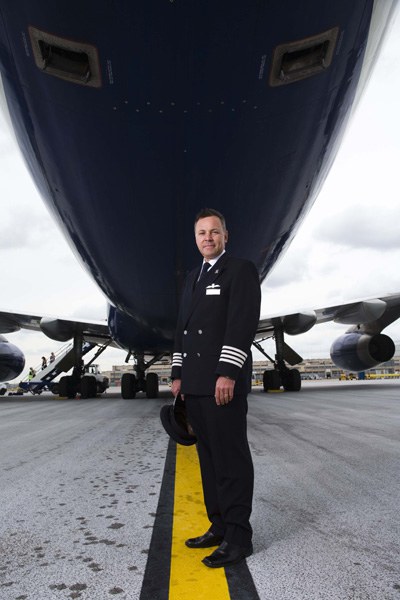|
 |
|
BA's Capt Steve Allright (ANDREA ARTZ) |
Imagine being prepared to sacrifice almost $2000 in charges just to avoid flying, missing out on business opportunities because you can't bring yourself to board a plane or jetting off on holiday and being so scared of flying home that you try to re-book by train.
For the people this happened to the fear of flying was all too real and it's not that uncommon. About 25 per cent of us experience some level of fear and one in 10 have a phobia about flying.
Today air travel is about as unremarkable as steam engines were a century ago, so there isn't much understanding for people who balk at the idea of an overseas holiday or having to fly somewhere to conclude a business deal. At best it's an embarrassing secret and at worst it can ruin holidays, strain relationships and even limit careers.
"People who're anxious about flying often don't realise that there are plenty of others who feel the same way and there are proven ways to deal with their fears," says Captain Steve Allright, who presents British Airways' Flying with Confidence course. Captain Allright, who is a senior British Airways training captain with over 11 000 flying hours, says there isn't a magic formula to cure a fear of flying. Rather Flying with Confidence provides nervous flyers with information and understanding about the issues causing their anxiety.
These can relate to the physics of flight, such as what keeps the plane in the sky, or the effects of turbulence, the mechanics of the aircraft and dealing with the underlying psychological causes of phobia and anxiety.
"There are two parts to the course. The first examines the technical side of flying. The clunk of the landing gear or the noise and vibration when the flaps are retracted or deployed are all perfectly normal, but can trigger anxiety. It really is a case of knowledge empowering, because if people know what is happening and why they feel more in control," explains Captain Allright.
"The second deals with understanding phobias and fears and practical, tried-and-tested ways of dealing with these, including being in the right mindset before you fly and how to react if you're becoming anxious."
As well as the accumulated knowledge of British Airways' pilots and cabin crew, the course also draws on the psychological expertise of four qualified phobia therapists. One attends each course to discuss the psychological tools for overcoming a fear of flying.
It is a combination which appears to work well and is underpinned by the testimonials on the Flying with Confidence website http://flyingwithconfidence.com/testimonials
In the last 25 years over 45 000 nervous flyers have attended the courses, which claim a 98 percent success rate. British Airways also puts its money where its mouth is and offers a 10 percent discount on international flights booked within a month of the course.
For more information about the course, visit: http://flyingwithconfidence.com/
Tips for nervous flyers:
• Remember aircraft are intended to be in the air. It is a very normal, safe environment in which they are designed to operate.
• Understand lift. It is the wings that enable the aircraft to fly, not the engines. A commercial aircraft flying at 30 000 feet can glide for 100 miles.
• Commercial aircraft are incredibly well maintained. Pilots and engineers carry out checks before every flight. Routine maintenance is conducted at regular, specified intervals by licenced engineers.
• Trust the crew. Pilots are the most highly trained and tested profession on earth. They undergo a rigorous selection procedure and are subjected to simulator tests every six months.
• Remember turbulence is uncomfortable but never dangerous. It is natural phenomenon and a perfectly normal part of flying.
• Reassure yourself that no matter how bad the weather the flight crew will always carefully consider the options and safety is always their top priority. They also have families and loved ones who have every expectation they'll return home from work safely.
• Air traffic controllers are trained, licensed professionals, who operate according to a very strict set of rules. All pilots must abide by the rules of the air.
• Learn to control your breathing. When you feel anxious hold your breath, then take a long, deep breath in, followed by a deep breath out. Continue long, deep breathing.
• Split a long flight into half hour sections. Go with a plan of things to do, perhaps things you never get around to. Write a letter, watch a film or read a book.
• Visualize yourself stepping off the aircraft into the arms of loved ones, or a lovely holiday destination or into a successful business meeting.
(Source: British Airways) | 